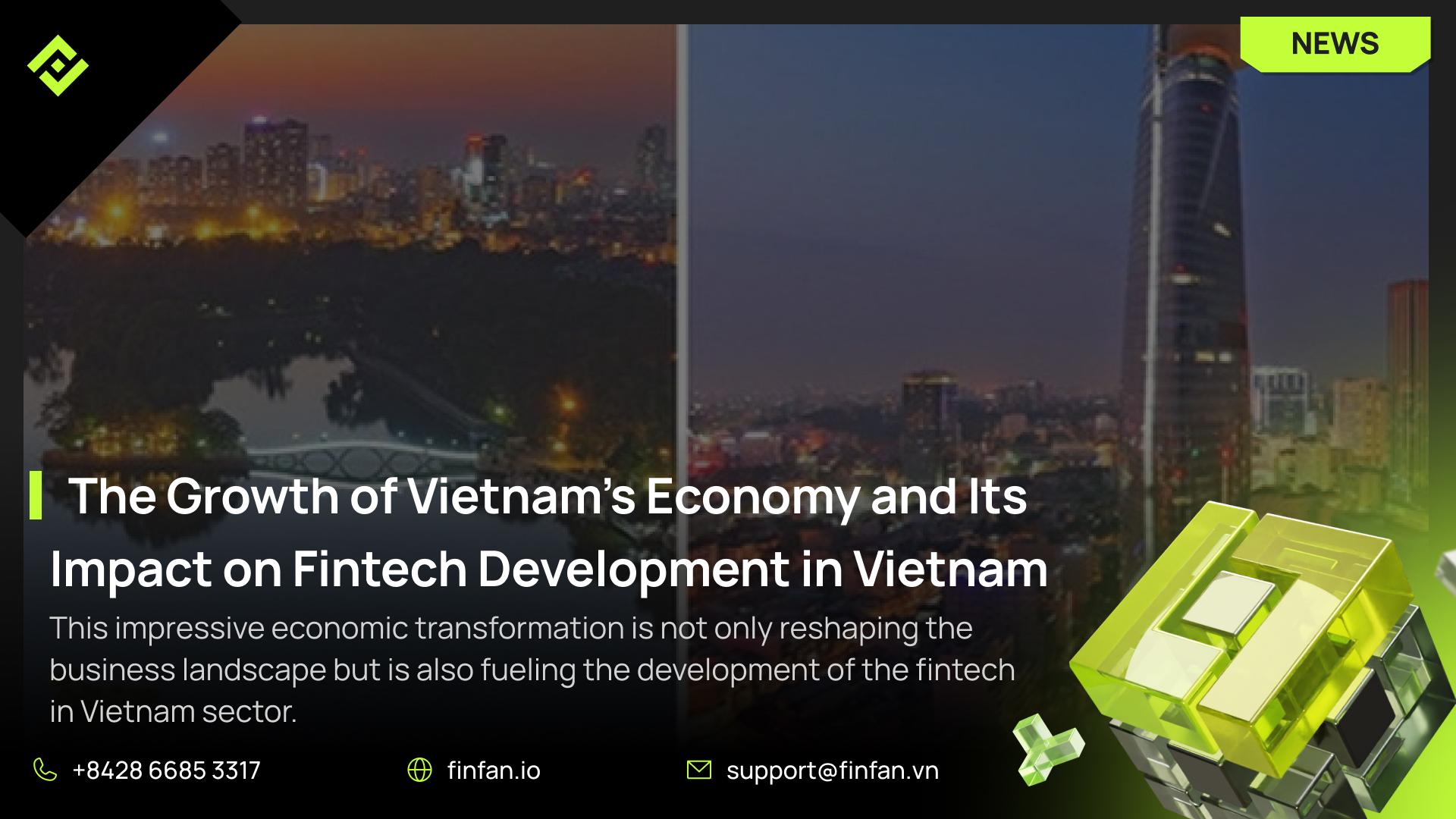The Growth of Vietnam’s Economy and Its Impact on Fintech Development in Vietnam

Vietnam’s economic growth has been one of the most remarkable in Southeast Asia over the past few decades.
With a GDP growth rate averaging around 6-7% annually, Vietnam has transitioned from a predominantly agrarian economy to one that is rapidly urbanizing, industrializing, and digitalizing.
This impressive economic transformation is not only reshaping the business landscape but is also fueling the development of the fintech in Vietnam sector.
Vietnam’s Economic Growth: A Brief Overview
The economy of Vietnam has grown significantly, driven by factors such as a young, tech-savvy population, expanding middle class, strong export sector, and increasing foreign direct investment (FDI).
Vietnam’s integration into global supply chains and its status as a manufacturing hub have attracted multinational corporations and significantly boosted economic development.
The rapid adoption of mobile technologies, internet penetration, and an emphasis on digital transformation are also key contributors to Vietnam’s growth.
Some impressive surveys updated by FinFan from VNExpress show that over 90% of Vietnamese people have been using mobile internet service packages during the first half of 2024.
Specifically, mobile broadband subscriptions increased by 7.6% compared to the same period in 2023, reaching an average of 91.9 per 100 people.
This marks the first time that this rate has surpassed 90%, exceeding the ministry's target of 87.5% for 2024.
Meanwhile, out of 120 million mobile subscriptions in Vietnam, 100.7 million are smartphone users, an increase of 0.1% compared to the same period last year.
Regarding fixed broadband, the number of subscriptions reached 23.5 per 100 people, an increase of 6.8%, achieving 96% of the annual plan. Among these, 82.2% of households are using fiber-optic cables.
This also expands opportunities for payment services through online applications on mobile phones to be developed.
As a result, many e-wallet applications have been growing significantly and have emerged as the top digital unicorns in Vietnam, making it to the top in Southeast Asia, such as MoMo, VNPay, and Timo digital bank...
Read more:
. Top 10 Fintech Companies in Southeast Asia
The Vietnamese government has been proactive in fostering this development through supportive policies and investment in digital infrastructure.
Notably, initiatives such as the National Digital Transformation Program aim to accelerate digital development in the economy and position Vietnam as a digital leader by 2030.
Fintech Growth in Vietnam
The fintech sector in Vietnam has experienced exponential growth in recent years, catalyzed by the country’s digital transformation, regulatory advancements, and the increasing demand for more efficient financial services.
The fintech landscape in Vietnam spans a wide range of services, including mobile payments, peer-to-peer lending, cryptocurrency trading, wealth management, and digital banking.
Rise of Digital Payments
As FinFan mentioned above, nearly 9 out of 10 Vietnamese people use mobile broadband subscriptions, so digital payment is an indispensable part of the development of fintech in the Vietnamese market.
Furthermore, as Vietnam’s e-commerce and digital economy expand, the demand for secure, fast, and efficient digital payment methods has soared.
Along with the development of e-commerce platforms, online marketplaces have also emerged, becoming one of the most attractive sales channels for small businesses in Vietnam, not only within the domestic market but also with the potential to expand internationally.
At the same time, new sales models such as affiliate marketing and drop shipping are increasingly evolving, leading to a growing demand for more advanced digital payment systems in Vietnam to keep pace with global growth.
This was highlighted by FinFan in an article about earning money on social media platforms by KOLs, KOCs, influencers, and others.
The increasing adoption of e-wallets like MoMo, ZaloPay, and VNPay exemplifies this trend. In 2020, Vietnam witnessed a 40% increase in cashless transactions, and the COVID-19 pandemic has only accelerated the shift toward digital payments.
Read more:
. The Intersection of Social Earning and Cross-Border Payments in Vietnam
. Top 10 Payment Gateway for E-Commerce in Vietnam Part 1
. Top 5 Types of Marketplace Payment Solutions In Vietnam
. Online Marketplace Payment Solutions Part 3 - Social Media in Vietnam – The Future of E-commerce
Financial Inclusion
One of the most profound impacts of Vietnam’s economic growth on the fintech sector has been its contribution to financial inclusion.
Many rural and underbanked populations now have access to financial services through mobile platforms and fintech applications.
This has reduced reliance on traditional banking institutions and empowered millions to participate in the formal economy.
Vietnam's ambition to provide 80% of its population with digital financial services by 2025 is driving fintech innovations that can reach underserved regions.
Regulatory Support for Fintech
The Vietnamese government has recognized the potential of fintech to drive economic growth and has responded with a more favorable regulatory environment.
Initiatives like the regulatory sandbox for fintech allow startups to test innovative services under regulatory supervision, fostering experimentation and growth in the sector.
Additionally, updated laws such as Circular 16/2020 on non-bank financial services have clarified the legal framework for digital payments and fintech providers, encouraging both local and international investment.
On the other hand, in the more risky areas of fintech such as P2P lending and blockchain, the government has been very cautious in making decisions that are most beneficial for the people, along with solutions to prevent and mitigate financial crimes related to corruption, money laundering, and financial fraud through tightened AML and KYC measures.
The most recent of these is Decree 52/2024/ND-CP regarding cashless payments in Vietnam.
Read more:
. Will the New Government Circular Affect Remittances to Vietnam?
. The Impact of the New Government Circular in Vietnam on Payment Accounts for Businesses
Fintech and Cross-Border Payments
Vietnam's growing role in the global economy has boosted cross-border transactions, creating a fertile ground for fintech solutions in the remittance and international payment spaces.
Cross-border payment services like Remitly and MoneyGram, and even local players like FinFan, have been crucial in facilitating efficient and affordable international money transfers, especially for Vietnam’s large diaspora.
After more than 10 years in the cross-border payment market, FinFan has continuously strived to provide cross-border payment solutions that are “Faster - Safer - More Cost-Effective” for overseas Vietnamese sending money back to Vietnam.
We have successfully developed the first e-wallet aggregator solution in Vietnam, which connects all e-wallets into one system for cross-border payments and money transfers from international partners in this field connected with FinFan, such as MoneyGram, Remitly, Ria Money Transfer, Paysend, and others.
From here, users only need to follow three simple steps to pay remittance money in real-time to Vietnam directly to the recipient's e-wallet.
The Challenges Ahead
While fintech in Vietnam is booming, several challenges remain. Regulatory complexity, cybersecurity risks, and consumer trust issues continue to hinder the adoption of fintech solutions.
Additionally, many fintech startups face stiff competition from traditional banks, which are also undergoing digital transformation to retain market share.
Furthermore, ensuring that fintech services are inclusive and reach the more rural or technologically disadvantaged areas remains a key challenge.
Conclusion Regarding the Connection between the Growth of Vietnam’s Economy and Fintech Development in Vietnam
Vietnam’s rapidly growing economy is a catalyst for the burgeoning fintech sector. As the country continues to digitalize and adopt technology, fintech will play a crucial role in shaping Vietnam’s future economic landscape.
The synergy between economic development, regulatory support, and fintech innovation presents opportunities for Vietnam to become a fintech leader not just in Southeast Asia but on a global scale.
The continued growth of fintech will depend on addressing the challenges of regulation, security, and inclusivity while fostering innovation to meet the demands of an increasingly digital economy.
As fintech continues to evolve, the future of cross-border payments looks brighter and more efficient than ever.
This article was curated and authored by FinFan's market research and development team, alongside our marketing department.
About FinFan
FinFan is a cross-border embedded financial services company that focuses on mass disbursement, fund collection, card processing, IBAN, and digital APMs solutions, which can provide valuable input and integration on and for the same.
FinFan is already integrated with almost the world's well-known MTOs, PSPs, switch, and core fintech platforms such as Money Gram, Thunes, Qiwi, Remitly, World Remit, Bancore, PaySend, Terrapay, Ria Money Transfer (Euronet), Dlocal, Ripple, TripleA, FoMo Pay, Wings, etc.
For more information, please get in touch with us through:
🌐https://finfan.io
📞(+84) 2866 85 3317
✉ support@finfan.vn
LinkedIn: FinFan





